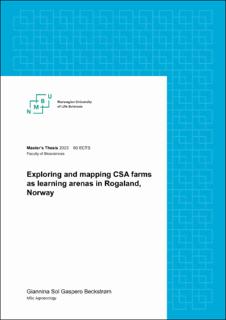Exploring and mapping CSA farms as learning arenas in Rogaland, Norway
Master thesis
Permanent lenke
https://hdl.handle.net/11250/3100603Utgivelsesdato
2023Metadata
Vis full innførselSamlinger
- Master’s theses (BioVit) [348]
Sammendrag
Community Supported Agriculture (CSA, or andelslandbruk in Norwegian) is a growing phenomenon in Norway and is increasingly recognized as an opportunity to reconnect consumers with the sources of their food, establish transparent partnerships between producer and consumer, and allow them to actively participate in their local food systems. Research on Norwegian CSA has identified that learning is an outcome of their participation, and more recently it has also been shown that learning is, for some, a motivation to join. However, the literature has yet to describe how these learning outcomes are produced. This master’s thesis was an attempt to fill this knowledge gap with a systemic exploration of CSA as a learning arena. Using participant observation, qualitative interviews and a questionnaire, I conducted a multi-case study at three CSA farms in Rogaland, Norway to create a conceptual map of their learning processes. Shareholders work and harvest with their own hands, giving rise to potent possibilities of experiential education. Dugnads, harvests, and social media provide exposure and invite conversation. This provides the chance for learning through knowledge exchange and transfer for farmers and shareholders alike. I found that the participatory and social nature of Norwegian CSA are core reasons for its rich learning environment. Learning is sourced from participation, conversation, written/online communications from the CSA, and self-directed learning endeavors. Learning is actualized through what I call “pathways,” which are learning by doing, knowledge transfer, and knowledge exchange. The learning outcomes I observed were gained knowledge, skill and awareness relating to vegetable cultivation, cooking, and agriculture in general.
